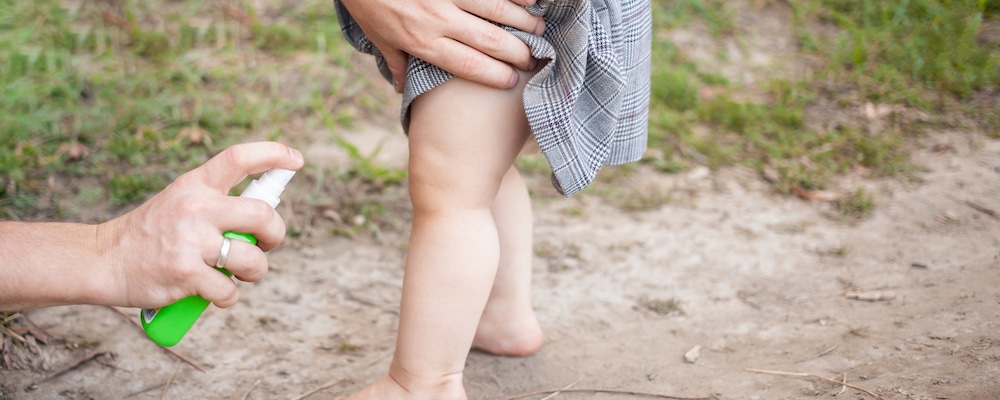
With the year-round danger mosquitoes pose to Florida’s residents, mosquito pest control remains necessary even when they appear scarcer than usual. Today’s article covers yearly mosquito activity, the importance of year-round mosquito control, and why the intensity of your next mosquito season may depend on how you handle the winter months.
Like many other animals and insects, mosquitoes also have a ‘season’ when they are most active. Because they’re cold-blooded, they depend on external heat and sunlight for warmth, and their numbers generally start to pick up as soon as spring rolls around, peaking during the summer.
Despite Florida’s winters being the mildest of any state, residents still enjoy a decrease in mosquitoes during the coldest season. Many assume this happens because mosquitoes either migrate or die off, but while they may stop biting and buzzing, they’re much closer than you think. This is one of the reasons that regular mosquito treatments by a trusted pest control company are necessary, even when you aren’t seeing signs of infestation.
Knowing the environmental changes that affect mosquito levels is important, as seasons do not always progress the same. Keep reading to understand what determines the duration of mosquito seasons in South Florida, and what this means for you.
When Does Mosquito Season Start and End?
With Florida sitting in two different climate zones, the duration and intensity of the seasons can differ between tropical Southern Florida areas like Coral Springs, Palm Beach, and Broward and the subtropical North-Central region of the state. If you live in South Florida where it’s warmer and more humid, winter temperatures averaging 65 degrees typically run from December to late February/early March. Further north, winters averaging 41 degrees Fahrenheit run from November through late March and early April.
The ideal temperature for mosquitoes is 80 degrees Fahrenheit, and they stop functioning if it gets too hot or too cold. At 60 degrees Fahrenheit, they start to slow down, and once it hits 50 degrees, they go into a hibernating state. Above 80 degrees, they also slow down. However, unlike when it gets colder, the diseases they carry will be even more infectious.
In other words, once temperatures climb above 50 and 60 degrees Fahrenheit during spring, you can expect mosquito activity to increase in the coming weeks, peaking around 80 degrees during the height of summer. Once your area hits 50 degrees in autumn in preparation for winter, mosquito season will be on its way out. However, pest control measures should still be taken.
What Happens to Mosquitoes During Winter?
When winter rolls around, mosquitoes combat the shutdown of their biological functions by entering a dormant state known as diapause. Unlike hibernation, which involves sleeping to conserve energy, the mosquitoes’ internal processes become suspended, preserving them and the diseases they carry until spring rolls around. Diapause can also differ by mosquito species, as some species will pause as eggs, while others pause as larvae or adult mosquitoes. Mosquito eggs can remain viable for up to eight months.
At the beginning of the new mosquito season, eggs and larvae from the previous season will resume development, while adult mosquitoes emerge to lay eggs and continue their species. If you had a mosquito infestation disappear in late autumn or early winter, you probably still have the issue. You just won’t realize it until spring rolls around and mosquitoes start popping up again fast.
Where do Mosquitoes Stay During the Winter?
Many mosquitoes spend the winter in trees, tall grass, logs, drains, and other breeding areas they may have occupied earlier in the year. But depending on the availability of standing water and other factors, they can also hide inside your home. If you take natural pest control measures throughout the year, such as the drainage of standing water and the use of homemade repellent, and have a mosquito treatment company doing regular sprays, you should continue after mosquito season has ended. This prevents them from surviving in areas such as:
- Basements, Kitchens, and Bathrooms – Mosquitoes only need a bottle cap full of standing water to lay eggs, which makes these areas of the home most susceptible to becoming breeding spots. Regularly check for leaks and standing water, and employ pest control measures to destroy any eggs or larvae.
- Vases and Flower Pots – Just as mosquitoes will hide in plants and dirt outside, indoor vegetation can also help them survive the winter. Ensure water is frequently changed and any excess removed. Plant-friendly natural pest control repellent may also help.
- Drip Pans – Appliances like fridges and air conditioners that produce condensation need drip pans to collect water condensed from the device. Empty these as often as possible.
- Any Open Containers – From pet bowls to buckets and sink overflows, if it can collect water, it can host mosquito eggs. Mosquito eggs can also stick to the sides of containers, so emptying the water may not be enough. Doing a quick scrub ensures there are no eggs left behind.
When to Call Pest Control Services for Mosquitoes in the Off-Season
If you employed the services of a mosquito pest control company during the year and dealt with the mosquitoes in and around your home this past mosquito season, it is reasonable to assume that there are not many of these disease-carrying pests hiding on your property. However, if any of the following applies to you, it may be time to have your pest control service provider come by for a winter checkup.
- You had an infestation at the end of the season – If this mosquito season was a bad one, and mosquito activity only started decreasing once the temperature dropped, it’s likely the mosquitoes around your home have gone into diapause.
- You are still getting bitten – While mosquitoes become lethargic as the temperature dips below 60 degrees Fahrenheit, they can continue to buzz and bite for some time. If you’re still fending off mosquitoes at the end of mosquito season, this is a sure sign they are still in the area and a mosquito treatment is needed.
- You have a lot of mosquitoes in early spring – If your mosquito season tends to start with a sudden and sharp increase in mosquitoes, you most likely have a lot of them spending winter hidden on your property each year. Reach out to a pest control professional.
By securing professional pest control services, you can prepare for next year’s mosquito season. An expert exterminator can inspect your property for signs of a dormant mosquito infestation, get rid of eggs, larvae, and adult mosquitoes, and provide treatment recommendations to protect you and your family ahead of next spring.
South Florida Pest Control Services from Gregory’s Pest Control
The safest, most effective way to remove bugs, pests, and rodents from your Florida home is to get a full-service treatment from a professional pest control provider.
Gregory’s Pest Control, based out of Coral Springs, Florida, has over thirty years of experience protecting families in Broward, Palm Beach, and other South Florida areas from infestations. We also have a barrier protection program to eliminate entry points and breeding areas, and an advanced maintenance service that sees one of GPC’s expert personnel returning for a checkup every 21-30 days.
Visit our services page to get a free quote or schedule a complimentary pest evaluation visit.

Paul Gregory
Owner/President of Gregory’s Pest Control
I’m a 2nd generation pest control owner who started working for my father in 1999. I was raised in South Florida and feel blessed to call it home for my entire adult life. As a long-term Florida resident, I recognize the challenges of controlling the many different pests that thrive in our subtropical climate. In particular, I understand how difficult it can be to prevent pests from invading our homes and businesses. By helping families solve their pest problems so they can live safer, more comfortable lives, I feel I am also meeting my family’s commitment to help our community. When I’m not out fighting pests, you can find me on the golf course or out on a soccer field where I have been fortunate enough to coach soccer to kids of all ages for the past 20 years.




